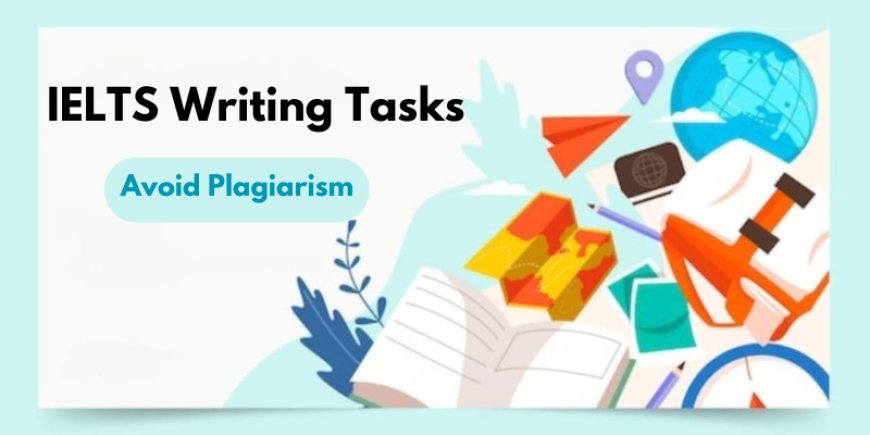How to Avoid Plagiarism in IELTS Writing Tasks?
Learn effective ways to avoid plagiarism in IELTS writing tasks, including paraphrasing, proper citation, and developing original ideas to boost your score.

Plagiarism is a critical issue for anyone attempting the IELTS exam. Copying phrases, sentences, or ideas without proper acknowledgment can negatively impact your writing score, as originality is a key factor in the assessment criteria. Understanding how to avoid plagiarism in your IELTS writing tasks is essential for achieving a high band score and demonstrating your language proficiency effectively.
This blog explores practical ways to avoid plagiarism in IELTS writing, helping you express ideas uniquely while maintaining coherence and accuracy.
Understanding Plagiarism in IELTS Writing
Plagiarism occurs when you use someone else's words or ideas without giving credit. In the context of IELTS, it can involve copying phrases from practice materials, textbooks, or even the test question itself.
The IELTS writing tasks are designed to assess your ability to express ideas in your own words. Plagiarized content shows a lack of originality and language skills, leading to penalties. To succeed, it’s crucial to learn how to avoid plagiarism while writing responses that are authentic and reflective of your own language ability.
By joining IELTS Coaching in Bangalore, you can access targeted exercises and personalized feedback to develop unique writing skills.
Why Avoiding Plagiarism Is Crucial in IELTS
Examiners are trained to spot plagiarized content, and any indication of it can affect your writing score. Here’s why avoiding plagiarism is vital:
-
Authenticity Matters: Your writing should reflect your language skills and thought process. Plagiarism undermines this.
-
Band Score Impact: The IELTS marking criteria emphasize lexical resource and grammatical range. Copied content fails to demonstrate these skills.
-
Ethical Practice: Avoiding plagiarism ensures that your work is a fair representation of your capabilities.
By understanding the importance of originality, you can focus on mastering ways to avoid plagiarism while preparing for the test.
Common Types of Plagiarism in IELTS Writing
Plagiarism in IELTS writing tasks can take several forms. Recognizing these can help you steer clear of them:
-
Copying from the Question Prompt: Simply rephrasing the question in your response can lead to a lower score.
-
Using Memorized Responses: Pre-learned answers that don’t directly address the topic are easily identified by examiners.
-
Borrowing from Practice Materials: Lifting phrases or ideas from study guides without adaptation can also be penalized.
To avoid these pitfalls, focus on developing your ability to paraphrase and express ideas in your own words, a key strategy for how to avoid plagiarism effectively.
Ways to Avoid Plagiarism in IELTS Writing
Here are actionable strategies to ensure your IELTS writing remains original:
1. Master the Art of Paraphrasing
Paraphrasing is one of the most effective ways to avoid plagiarism in IELTS writing. This involves rephrasing sentences while retaining their meaning.
-
Use synonyms to replace keywords.
-
Change the sentence structure while maintaining clarity.
-
Break long sentences into shorter ones for simplicity.
For instance, if the prompt states, "Technology has significantly impacted communication," you could write, "Advancements in technology have transformed how people communicate."
2. Avoid Copying Entire Phrases
Even if the wording is tempting, copying large portions of text from the question or other sources should be avoided. Instead, focus on extracting the main idea and expressing it in your unique style.
3. Practice Summarizing Skills
Summarizing involves condensing information into a shorter form while capturing the core message. This is particularly helpful for Task 1 of IELTS, where you need to describe trends or data.
-
Identify the main points in the data or passage.
-
Write them concisely using your own words.
4. Use Original Examples
Including examples to support your argument is a great way to boost your score. Ensure these examples are personal or imagined rather than borrowed from external sources.
5. Expand Your Vocabulary
A rich vocabulary allows you to express ideas flexibly, reducing the need to borrow phrases. Make a habit of learning new words and their usage regularly.
Training programs like IELTS Training in Marathahalli often include vocabulary-building exercises, helping you confidently express your ideas without relying on memorized phrases.
Enhancing Originality in Writing
Originality doesn’t just mean avoiding plagiarism; it involves adding your unique perspective. Here’s how to enhance the originality of your responses:
1. Develop Your Ideas
Brainstorm unique viewpoints and arguments for each topic. This ensures that your content stands out from memorized or formulaic responses.
2. Practice Writing Regularly
Frequent practice improves your ability to articulate thoughts independently. Focus on writing essays on a variety of topics to build versatility.
3. Seek Feedback
Have a mentor or teacher review your practice essays to identify areas where you unintentionally copy or rely too heavily on certain phrases.
These practices not only show you how to avoid plagiarism but also help you develop a confident writing style.
Tools and Resources to Avoid Plagiarism
Although IELTS is a paper-based or computer-based test, using tools and resources during practice can help refine your writing:
-
Online Plagiarism Checkers: Tools like Grammarly or Quetext can highlight unintentional plagiarism in your practice essays.
-
Thesaurus: Use a thesaurus to find synonyms and expand your vocabulary.
-
Writing Guides: Study reputable IELTS preparation books and guides that teach effective paraphrasing and summarizing techniques.
Incorporating these resources into your preparation can strengthen your understanding of ways to avoid plagiarism in IELTS writing.
The Role of Ethical Writing Practices
Avoiding plagiarism is part of maintaining ethical writing practices. Beyond IELTS, these skills are invaluable in academic and professional settings. Ethical writing demonstrates integrity, respect for others’ work, and confidence in your abilities.
By learning how to avoid plagiarism during IELTS preparation, you’re not just improving your score—you’re building a foundation for lifelong communication skills.
Plagiarism is a common pitfall for IELTS test-takers, but it’s entirely avoidable with the right strategies. By mastering paraphrasing, summarizing, and expanding your vocabulary, you can ensure your responses are original and reflective of your language skills.
Whether you’re preparing independently or seeking guidance, understanding how to avoid plagiarism is a crucial step toward success in the IELTS writing tasks. Focus on developing your unique voice and expressing ideas authentically, and you’ll not only avoid plagiarism but also excel in showcasing your English proficiency.
What's Your Reaction?

























